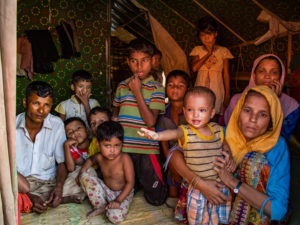 I have been following the events in the Rakhine State in Myanmar for many months now as the Rohingya crisis has been escalating precipitously. A September United Nations report calls for military leaders to face charges for genocide. A U.N. team of investigators has documented the atrocities:
I have been following the events in the Rakhine State in Myanmar for many months now as the Rohingya crisis has been escalating precipitously. A September United Nations report calls for military leaders to face charges for genocide. A U.N. team of investigators has documented the atrocities:
· More than 750,000 Rohingya have been displaced to Bangladesh, beginning in mid-August last year.
· Thousands have been killed in their villages.
· Evidence abounds for the use of rape and torture as a means of control.
· Religious liberty is not protected, e.g., Muslims have not been able to celebrate their holidays.
· Military forces (the Tatmadaw) are confiscating their land and erasing their historical presence by burning their villages.
Already not recognized as one of the certified ethnic groups among the 135 of Myanmar, the Rohingya lack basic rights of national identity even though they have been in the Rakhine State for many generations – some say since the mid-19th century. The U.N. report says that the gross human rights violations and “serious violations of international humanitarian law that it found amount to the gravest crime under international law.” Is the West helpless in the face of such brutality?

A Rohingya family clusters together in their makeshift home located in the Jamtoli refugee camp near Cox’s Bazar, Bangladesh. (Photo by Francisco Miguel Litardo/Central Seminary)
The “clearance operations,” as the military pillaging is called, have moved this people to the edge of existence. One person among those who have been displaced to Bangladesh said, “I will not go back until they recognize our rights like others in Myanmar. Otherwise, I would prefer to die here.” And it is quite possible that Cox’s Bazaar – the holding place for hundreds of thousands – may be where earthly life ends for this person and many others. While the Myanmar government speaks of repatriation, the displaced are very skeptical that they will be accorded any protection or legal status. Returning to barbed-wire reception/holding centers is less desirable than the small measure of autonomy gained in Bangladesh.
The West has been baffled as to why the great moral voice for the freedom of the nation, Aung San Suu Kyi, has been largely silent about what some have called “ethnic cleansing.” Can she not prevent this intentional extermination of an ethnic minority that is occurring on her watch? Where is the fierce determination that saw her through years of house arrest and suppression?
Actually, there are some significant limits on what she can actually do. When the national elections occurred two years ago, and her party was elected to power, there was genuine euphoria in the West. The United States lifted sanctions, and many nations began to invest in Myanmar. Enthusiastic supporters failed to read the fine print about what Myanmar’s constitution actually says. The military retained 25 percent of parliament seats as well as veto power on constitutional change. It would require constitutional change for Rohingya to have a state-recognized presence in the country. Yet, the tonality of the Nobel Peace Prize winner’s indifference to the plight of this people is startling.
Another challenge is the status of Muslims in Myanmar. Buddhism enjoys the status legally as the preferred religion, and approximately 88 percent of the population is Buddhist. Christians are nearly 7 percent and Muslims are a little over 4 percent, according to the U.N. report. The military has argued – without evidence – that the Rohingya are a launching point for ISIS or other radicalized Islamic groups, and protecting the country means a harsh evisceration of this possibility. Once again, the actions of a few have resulted in massive suspicion of one of the great world religions.
“My hope is that our government’s preoccupation with ‘America first’ will not squander what power we have to effect change.”
The U.N. report will go to the Security Council, and the recommendation is that Myanmar’s top general, Min Aung Hlaing, and five other commanders stand trial for crimes of genocide. The Security Council then has the option of referring Myanmar to the International Criminal Court. Whether the U.S. should reinstate sanctions as leverage is an essential consideration at this point. My hope is that our government’s preoccupation with “America first” will not squander what power we have to effect change.
Myanmar’s Rakhine State is not alone in facing military oppression. Kachin and Shan States have also experienced a sharp increase in fighting between the Tatmadaw and armed local militias such as the Kachin Independence Army. In addition to religious clashes, grievances over land use, development projects, exploitation of natural resources and opium traffic heighten the animosity. Violations of human rights abound in these northern states, and cessation of conflict will be hard-won as long as the tactics of Myanmar’s armed forces continue.
At Central Baptist Theological Seminary, our partnership with Myanmar Institute of Theology calls us to be mindful of what our colleagues wrestle with all the while. As most of the Christian leaders are ethnic minorities themselves, they know the precariousness of existence and freedom. They understand the wounded Body of Christ in ways hard for us to fathom. Their faith is vibrant, although shadowed by the suffering that is never far away.
Baptist Christians here in the U.S. have the moral responsibility to continue “naming the unspeakable” experienced by children of God in other parts of the world.
